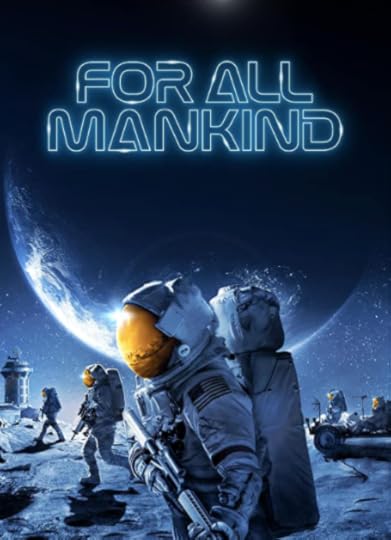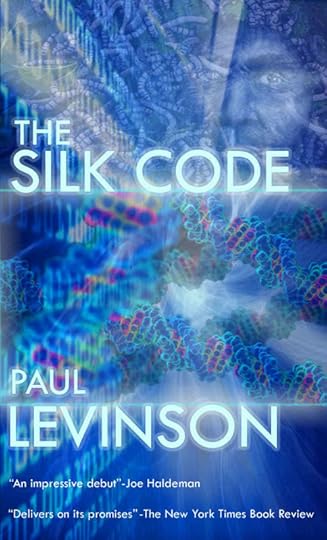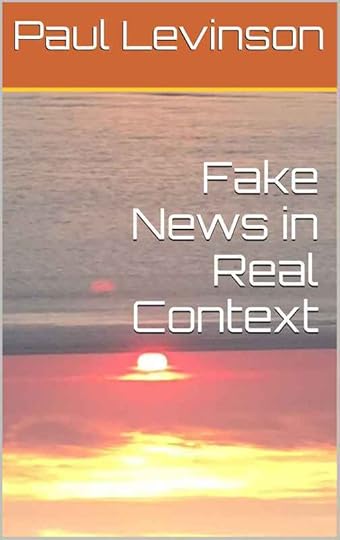Paul Levinson's Blog: Levinson at Large, page 100
April 16, 2021
The Nevers 1.1: Never Say Never

I wasn't going to watch The Nevers. I'd pretty much given up on superpowers on television after Heroes. On the other hand, how can you resist late 1890s London, the prime of Victorian times, the birth of The Time Machine, on the cusp of the 20th century? I couldn't, and I'm glad of it.
Or as Lord Massen says, halfway at this point between villain and defender of tradition, this is a time which hosts "the first generation accustomed to the impossible". He's right about that, but not about upholding English wording such as "the employed" over the French "employees". As Amalia True (Laura Donnelly aka Jenny Fraser of Outlander) aptly instructs Massen, the French has the advantage of easily describing a single employee or multiple employees. That's clearly true, as is True being a clearly good an intriguing character, not only because of her linguistic skills but her ability to see slightly into the future. Like I said, those late 1890s were a time of time travel, and The Nevers looks like it might mine that and many other wonders.
Some of these are already embodied in marvelous contraptions like a sleek, cool, late Victorian automobile which makes an appearance at the beginning and a gossamer flying machine which can bring back the dead or at very least the drowned which makes an appearance at the end, which come to think of it is consistent with reversing death, and promises lots of life in this series set to run on HBO in two six-episode segments.
The scenery is fetching, the accents delightful, and the acting is top notch. It was especially good to see Ann Skelly (from Red Rock!) as Penance Adair with the power to see electrical patterns, and Ben Chaplin (from Press) as Detective Frank Mundi. It's hard to beat those superpowers, but those late 19th-century detectives, on both sides of the Atlantic, had an impressive gruffness all their own.
So never say never. I'll be sticking with The Nevers and I'll see you here next week with another review.
"challenging fun" -- Entertainment Weekly
April 15, 2021
For All Mankind 2.9: Relationships

Well, it was a night for all kinds of profound changes in relationships in For All Mankind 2.9, in addition to some of what happened on the Moon.
Here are the changes:: Karen told Ed that she slept with someone last week, but didn't tell him who (my take: she shouldn't have told him about last week at all, especially when he was on the verge of blasting off on a new mission). Ed couldn't quite blast off, though, with a woman he later meets at a bar (apologies for the pun -- I was sorry to see that happen, though). Molly and Wayne almost break up over Molly's insistence on going to Mexico for a quack treatment for her glaucoma, but she comes to her senses and she and Wayne hug and are staying together (good!). Tracy and Gordo are back in bunk together on the Moon (yes!) (more about the Moon in paragraph after next). And Ellen and Pam break up, more specifically Pam leaves so as not to get in the way of Ellen maybe being elected President someday, and, that great alternate reality flourish deserves a paragraph of its own.
Lee Atwater, a real historical political operator/genius (depending on how you look at it), who in our reality helped Reagan win twice and George H. W. Bush win the Presidency once, thinks Ellen should run for Congress and eventually President! Other than Atwater being a Republican, I think that's a great path For All Mankind to follow in subsequent seasons, and I very much look forward to that.
But back to the Moon, for now, in this alternate 1983 history: Of course the Soviets were bound to attack on the Moon, even as they went ahead with Apollo-Soyez, because they had to take some revenge for last week. But it was tough to see, especially after Danielle earlier quoted from Star Trek. The U. S. and the Soviets at war is a poor path to a United Federation.
And I'll be back here next week with thoughts on the season finale.
See also For All Mankind, Season 1 and Episode 2.1: Alternate Space Race Reality ... For All Mankind 2.2: The Peanut Butter Sandwich ... For All Mankind 2.3: "Guns to the Moon" ... For All Mankind 2.4: Close to Reality ... For All Mankind 2.5: Johnny and the Wrath of Kahn ... For All Mankind 2.6: Couplings ... For All Mankind 2.7: Alternate History Surges ... For All Mankind 2.9: Really Lost in Translation

Paul Levinson's books ... Paul Levinson's music
April 14, 2021
Big Sky 1.10-11: Rocky Mountain High, Somewhat Twisted

Big Sky was back last night after its long break with a double episode, and what felt a lot like a new season, not just the second part of the first. That's because Legarski is gone and Pergman looks like a bit like a demented John Denver, or a Denver holding in his homicidal urges and instincts. He has a girlfriend who seems to love or at least really care about him, with a child that Pergman seems to be a good father to. He tells his girlfriend he's sorry every time he blurts out something from his twisted, angry inner self.
But there's no shortage of bad guys who are evil and dangerous both inside and out. In fact, a whole new family, with Horst Kleinsasser (played by Monk's Ted Levine as the patriarch) who are up to no good and worse. The net effect is a tableau of dangers Cassie and Jenny have to face, even with Pergman out of that picture. But I have a feeling he won't be out of it too long.
The dialogue, as in the first part of the season, is snappy, sarcastic, and refreshing. And peril lurks at every turn. Cassie doesn't like a young cop, and remarks to Jenny that he's an "asshole". That's a good call -- he kidnaps Cassie at the end of the second episode, to do who knows what to and/or with her.
My guess is this cop is Legarski's successor, or connected to the same young women trafficking ring as the departed bald guy. That part of the first part of the season's story -- the full extent of the trafficking ring -- was never addressed last season. In addition to Cassie's fate, the big question now about that ring is when Pergman will reconnect with it.
All in all, Big Sky remains an attractively quirky show, with those wide Montana vistas still being so well welcome to look at as we slowly come out of our lockdown.
See also Big Sky 1.1: A Pretty Big Deal ... Big Sky 1.2: The "Goods" and the Ruined Plan ... Big Sky 1.3: "You Kidnapped the Wrong Girl" ... Big Sky 1.4: Controls on Psychos ... Big Sky 1.5: Winter Finale Indeed! ... Big Sky 1.6: "Sweet Psycho" ... Big Sky 1.7: The Montana State Trooper ... Big Sky 1.9: Crafty Ronald
 Paul Levinson's books ... Paul Levinson's music
Paul Levinson's books ... Paul Levinson's music
New Summer Session Online Course at Fordham: "Science Fiction from Page to Screen"

Hey, I'll be teaching a brand new course at Fordham University this summer that I proposed, created, and developed over the past few months: "Science Fiction from Page to Screen". I'll be teaching the course entirely remotely, via live Zoom lectures and interviews, and group and individual email discussions, so you don't need to be in New York City to take it -- you can be anywhere in the world. And you don't need to be a student at Fordham. The course carries four undergraduate credits, and you can take the course as a visiting student from another university, or if you're a college graduate, or, if approved, if you're a high school senior (and in exceptional cases, a high school junior).
The focus of the course this summer will be Philip K. Dick's iconic award-winning 1962 novel, The Man in the High Castle, made into the Emmy-winning four-season series (2015-2019) on Amazon Prime Video, starring Rufus Sewell -- who will be be making a special Zoom appearance in our course for a live interview by me in July!
For those you who may not know me, I'm a tenured professor (former Chair of the Department of Communication and Media Studies) at Fordham University, author of seven science fiction novels (including The Plot to Save Socrates and my Locus Award winning first novel, The Silk Code) and more than forty stories, former President of the Science Fiction and Fantasy Writers of America (1998-2001), and a lifelong admirer of Philip K. Dick's work. More about me here.
I'm really looking forward to teaching this course and welcoming Rufus Sewell to Fordham!
Here is the course description:
FITV 3635 PW1 - Science Fiction From Page to Screen
Session III, June 1 - August 5, 2021
Online: TTh, 3-5 p.m.
This course examines the unique, dynamic relationship between written words published as novels and short stories and their adaptation in TV series and motion pictures, in the genre of science fiction. Issues include the reader’s expectations about screen adaptations, the challenge of visualizing the impossible in science fiction, multiple movies from a single source, and books within books as a literary and cinematic device. The course will focus on a single iconic novel adapted into a multi-season TV series.
CRN: 12993
Instructor: Levinson
4 credits
Registration details for visiting students are here. Tuition details are here.
Paul Levinson's books ... Paul Levinson's musicApril 13, 2021
Debris 1.7: Ferry Cross The Moebius

An interesting Debris 1.7 last night, that served up another example of what the debris can do, mixing horror and humanity in the now signature way that Debris does this, but not moving the ball of understanding very much forward.
Speaking of signatures, the story had a lot of nice mythological touches, beginning with the mention of the ferry, and moving on to the sweet little girl with supernatural i.e. debris-endowed powers. These interludes have a scrapbook-like quality. If only Bryan and Finola could see the whole scrapbook, rather than just these weekly pages. I feel the same way as a member of the audience.
In my review of last week's episode (1.6), I objected to the assumption of Bryan, Finola, and their superiors that says governments are the proper custodians and regulators of the debris and all their effects. No one in any country ran on a platform in which they asked the voters to give them sole or any power to represent humanity and human interests in the event that we are visited by extraterrestrials and their debris.
Someone on Twitter (maybe Scroobius Pip under a pseudonym) commented that that's what Anson Ash is saying and working against (he's played by an actor with a perfect name for a narrative like this, Scroobius Pip -- a combination, in my head at least, of Ebenezer Scrooge and moebius strip). In last night's episode, he's unceremoniously tortured by Maddox for information. And that of course brings home the point, doesn't it? What is our government doing torturing this guy?
Back in the days of 24, Jack Bauer would regularly torture anyone who had valuable information about a terrorist plot and didn't want to share it. But Ash is not quite a terrorist. He's fighting for something which might take innocent lives, for sure, but the philosophy of his cause has an angelic element. Fighting about a boat which, so far in this story on the screen, doesn't have a name.
See also Debris 1.1 Some Probability of Gems Among the Pieces ... Debris 1.2: Clones ... Debris 1.3: Trapped Out of Time ... Debris 1.4: Suspentia Belief ... Debris 1.5: Fine Tuning ... Debris 1.6: Fountain of Youth and Its Complications
Debris 1.7: Ferry Cross The ...

An interesting Debris 1.7 last night, that served up another example of what the debris can do, mixing horror and humanity in the now signature way that Debris does this, but not moving the ball of understanding very much forward.
Speaking of signatures, the story had a lot of nice mythological touches, beginning with the mention of the ferry, and moving on to the sweet little girl with supernatural i.e. debris-endowed powers. These interludes have a scrapbook-like quality. If only Bryan and Finola could see the whole scrapbook, rather than just these weekly pages. I feel the same way as a member of the audience.
In my review of last week's episode (1.6), I objected to the assumption of Bryan, Finola, and their superiors that governments are the proper custodians and regulators of the debris and all their effects. No one in any country ran on a platform in which they asked the voters to give them sole or any power to represent humanity and human interests in the event that we are visited by extraterrestrials and their debris.
Someone on Twitter (maybe Scroobius Pip under a pseudonym) commented that that's what Anson Ash is saying and working against (he's played by an actor with a perfect name for a narrative like this, Scroobius Pip -- a combination, in my head at least, of Ebenezer Scrooge and moebius strip). In last night's episode, he's unceremonious tortured by Maddox for information. And that of course brings home the point, doesn't it? What is our government doing torturing this guy?
Back in the days of 24, Jack Bauer would regularly torture anyone who had valuable information about a terrorist plot and didn't want to share it. But Ash is not quite a terrorist. He's fighting for something which might take innocent lives, for sure, but the philosophy of his cause has an angelic element. Fighting about a boat which, so far in this story on the screen, doesn't have a name.
See also Debris 1.1 Some Probability of Gems Among the Pieces ... Debris 1.2: Clones ... Debris 1.3: Trapped Out of Time ... Debris 1.4: Suspentia Belief ... Debris 1.5: Fine Tuning ... Debris 1.6: Fountain of Youth and Its Complications
Podcast: Review of Q: Into the Storm
Welcome to Light On Light Through, Episode 170, in which I review Q: Into the Storm.
Blog post review of Q: Into the Storm.
Paul Levinson's books ... Paul Levinson's music
April 12, 2021
City on a Hill 2.3: Seismic Shift

I'm watching but not reviewing every episode of City on a Hill these days -- too much other writing to be done -- but episode 2.3 was impossible not to review, because [Spoilers follow ... ]
Well, the episode blurb on Showtime's page concludes with "Jimmy Ryan, meanwhile, faces problems far worse than a guilty conscience." Yes, he does. Problems from Cathy Ryan. She has every reason to hold Jimmy responsible for what happened to Jimmy's brother, her husband Frankie. And, now she has a monetary reason to shoot Jimmy to death. Which she does.
And this signals a bigger shift in this series than just the killing of one man. It signals something which was already beginning to happen last season, something which has been implicit in this narrative all along: women climbing right up there to the top of the hill with the men in this town. Women claiming power.
Now, I'm no expert on the power allocations in Boston in the 1990s. But I suspect that the ascendance of women in this narrative may be more fictional than truly historic. Someone correct me if I'm wrong. But would the real-life equivalent of Cathy Ryan have done what she did last night?
Meanwhile, it was good to see Jackie last night begin to tell at least a little of his family history to his daughter. That brought home an important point, too. As corrupt as Jackie is, he's still much better than his father and his grandfather and who knows how far back. He's working, still working. And maybe even doing some good, even if accidentally,
And, to conclude on a happy note, it's good to see DeCourcy's (great name) wife pregnant. Will this make DeCourcy a little more willing to constructively compromise on important issues? Certainly with his wife. But I'm guessing in his professional relentlessness too.
See also City on a Hill 2.1: Big Dig
See also City on a Hill: Possibilities ... City on a Hill 1.2: Politics in a Cracked Mirror ... City on a Hill 1.3: One Upping The Sopranos ... City on a Hill 1.4: Enjoyable Derivative ... City on a Hill 1.6: Tony's Mother, Mayhem, and Family ... City on a Hill 1.7: The Bodies ... City on a Hill 1.8: Personal Business and Its Accompaniment ... City on a Hill 1.9: Changes ... City on a Hill season finale: "You Ain't the Good, and I Ain't that Bad"

April 11, 2021
Q: Into the Storm: Riveting, Breathtaking, But Not Completely Persuasive

I just binge-watched Q: Into the Storm, a six-part documentary on HBO Max. It's about as breathtaking, daring, and informative a documentary, episode for episode, as ever I've seen. [Spoilers follow....]
That's in large part because it's extraordinarily current, ending a day or two after the insurrection at the Capitol on January 6, 2021. But it's also because Cullen Hoback, who made the series as well as stars in it as its investigator, managed to present a life-and-death true story, with real people you gradually come to know surprisingly well, and a grade-A real mystery all in one series.
The mystery is at the heart and soul of this documentary: who is the Q in QAnon? We think Q's a he. We know Trump was (and maybe today still is) the mythical arch hero in Q's and the QAnons' mythology, and that the real Trump began to retweet and maybe truly believe some of their ideas. We know that the January 6, 2021 attack on the Capitol was at least in part inspired by their beliefs. We know that, although conspiracy theories have likely been with humanity since Neanderthals were the most prevalent form of our species, that QAnon is to date the quintessential creation of social media. What we don't know is: who was or is Q?
Into the Storm is the story of how Hoback struggled to answer that question, and indeed thinks he answered it. The reason I'm putting the resolution of this documentary in those terms, though, is that ... I'm not completely convinced about Hoback's answer. The two best choices that Hoback presents are Steve Bannon and Ron Watkins, 8Chan administrator and who knows what else. (I assume you know who Bannon is.) In a decisive turning point in the documentary, Watkins tries to convince Hoback that Bannon is Q, via IP address locators, and the fact that Q seemed to have access to information that only a Trump insider would have. But Hoback doesn't think Q would be so stupid as to make his IP address available even to as savvy an Internet player as Ron Watkins, and finds that Bannon said Michael Flynn (another QAnon hero) was a disaster, and Hoback therefore concludes instead that Ron Watkins is actually Q, and was trying to throw Hoback off track by offering up Bannon.
I'm willing to say, on the basis of documentary, that I think Ron Watkins is likely Q, but I'm not totally convinced. One of Hoback's main reasons for thinking Watkins is Q is Watkins' inconsistent statements about what he knew and didn't know about what Q was posting. But people make inconsistent statements all the time. Also, unless I missed it, I don't think Hoback ever provides a clear explanation of how Watkins, who wasn't a Trump insider, obtained the Trump insider info that Q displayed. And just as Hoback thinks Ron Watkins deliberately said things to disguise his true identity, surely Bannon would have done the same (such as trashing Flynn) to get people to look elsewhere for Q.
So, I think Bannon is still in the running, as at least an outside shot. Or Q could be someone else, or maybe a team of people, another hypothesis considered then discarded in the documentary. But that ambiguity does not make Q: Into the Storm one bit less worthy of viewing, as an all too-frightening, all too human, astute depiction of what happened and almost happened in America and the world.
 Paul Levinson's books ... Paul Levinson's music
Paul Levinson's books ... Paul Levinson's music
April 9, 2021
For All Mankind 2.8: Really Lost in Translation

In terms of humans going out into our solar system, the only really significant event happened at the very of For All Mankind 2.8. But it was a significant event indeed.
[Spoilers follow]
We -- the Americans -- killed one Soviet cosmonaut, and badly wounded another, on the Moon. Our astronaut Marines thought the Soviets were reaching for a weapon, when they were reaching only for a translation card. Brings a whole new devastating meaning to lost in translation.
Because what has now been lost in this alternate history is the thin veneer of peace in space, the For All Mankind mantra that is the very title of the series. True, the Soviets took that little lunar base from us. But surely there had to be a better response than bringing our violence on Earth up to the Moon.
The repudiation of peace is consistent, though, with the Ronald Reagan in our own reality. Although his anti-ballistic missile "Star Wars" initiative, which I strongly supported, undermined the Soviet Union and got it to crumble, Reagan's militarism in South America in the Nicaragua Contra business almost led to the undoing of his administration. We were provoked in both realities -- ours and the one in For All Mankind -- by the Soviet shooting down the civilian KAL 707 airplane. But sending a military force to the Moon with shoot-to-kill orders if necessary was not the way to go.
The U.S. in this alternate history also wants to arm the Pathfinder flight to Mars. This would not be to fight off Martians. In our reality, again, Trump initiated the Space Force. I'm all in favor of military in space if we're talking about Captain Kirk and the Federation. But that's idealistic fiction about the future. For All Mankind, at this point, is fiction about an alternate past. That past looks, as of now in episode 2.8, to be leading to a far more dangerous future than Star Trek.
Although I don't like that development at all, to say the least, kudos to For All Mankind for showing it to us, or showing us to us, in the new episode up today on Apple TV+.
ee also For All Mankind, Season 1 and Episode 2.1: Alternate Space Race Reality ... For All Mankind 2.2: The Peanut Butter Sandwich ... For All Mankind 2.3: "Guns to the Moon" ... For All Mankind 2.4: Close to Reality ... For All Mankind 2.5: Johnny and the Wrath of Kahn ... For All Mankind 2.6: Couplings ... For All Mankind 2.7: Alternate History Surges

Paul Levinson's books ... Paul Levinson's music
Levinson at Large
- Paul Levinson's profile
- 340 followers







